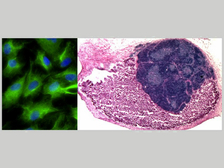Researchers from Scotland, is said to have grown for the first time within the animal a functioning organ from scratch. The group of the cells after transplantation into mice transformed into thymus – an important part of the immune system. This achievement can be an important step towards the development of alternative methods of organ transplantation.
The thymus gland, or thymus, located in the upper part of the human chest and produces components of the immune system – T cells that fight pathogens. They explore the different parts of the body for faulty items and infections. When they detect the problem begins to form a coordinated immune response that tries to eliminate harmful cells, including cancer and pathogens (bacteria and viruses). Structurally, the thymus consists of two main parts – the cortex and medulla. The latter produces T-cells.
Scientists from the University of Edinburgh, began the process of cultivation of the body with the removal of the cells from mouse embryos. Then, these cells were reprogrammed genetically and become transformed into a cell type contained in the thymus. Later, they were mixed with other cells and placed into mice (in the kidneys), and, once inside the body, scattered cells gathered in a functioning organ.
This study – as an important milestone, as well as an experiment in 2013 in which grown in the laboratory human brain has reached the level of development of the brain of the fetus a nine. However, the thymus – the body is much more simple, and in these experiments has reached a fully functional state.
“It was a complete surprise to us, – says Professor Clare Blackburn (Clare Blackburn), a member of the research team. – We were able to generate a fully functional, fully organized body of reprogrammed cells, with a very simple way. Our opening – attractive prospects in terms of the broader field of regenerative medicine “.
Perhaps because of this discovery can help patients who in need of a bone marrow transplant, as well as children who are born with a non-functioning thymus. The method may also be useful for the elderly, as the body decreases with age in size, which leads to a weakening of the immune system.
It is true that there are a number of obstacles, which the research team will have to overcome before the research will go on the stage animal experiments by the method of treatment. Firstly, now used as the basis of embryonic cells, i.e. there is no guarantee the coincidence of the donor tissue with a tissue recipient. Second, the researchers will also have to make sure that uncontrollably forming cells do not give rise to cancer.
Experts believe that in the next five years it will be possible to create complex organs with specialized cells derived from stem and reprogrammed. Whatever it was, this procedure will experience another set of checks and improvements.
Details of the research were published in the edition of Nature Cell Biology.
Also on the topic:
cultured kidney caught in mice
Scientists have grown human livers in the head
mice transplanted mouse salivary and lachrymal glands grown from stem cells
Scientists build artificial organs with the help of electronic technology Industry
created in the laboratory of the vagina successfully operate
Pochini himself: a person can be repaired
->

the first time scientists have grown a fully functioning organ grafting by in vitro cell in the body in live mice.
No comments:
Post a Comment